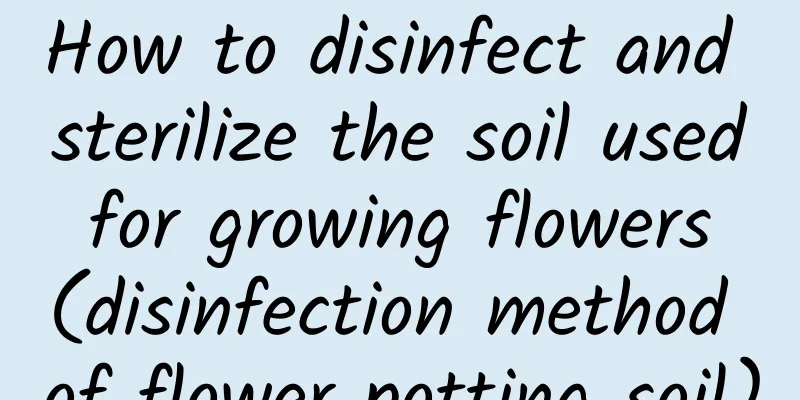How to disinfect and sterilize the soil used for growing flowers (disinfection method of flower potting soil)

1) Sun exposure methodIn sunny weather, first spread out the prepared flower soil and expose it to the sun for 5 to 7 days. Turn the soil over while drying it every day to allow the flower soil to fully receive the scorching sun to kill germs, weed seeds and insect eggs. It is best to expose the soil to the sun at noon in summer. Although this method of exposing the soil to the sun is not very thorough, it is simple and easy. 2) Chemical fumigation methodUsing drugs to disinfect the flower soil is a relatively thorough method. You can use potassium permanganate or 40% formaldehyde 400-500 ml diluted with 50 times water. Before disinfection, pile the culture soil on the cement floor, and turn the soil over while spraying the agent to accelerate the penetration of the agent so that it can penetrate into the flower soil as quickly as possible. After spraying the medicine, put the flower soil into a bucket, then seal the bucket lid with plastic film. After fumigation for 48 hours, remove the film and dry it in the sun for 3 to 5 days before using it to plant flowers and trees. 3) Stir-frying in an iron panFirst put the prepared flower soil into an iron pot, set up a stove outdoors, and stir-fry the flower soil in the iron pot for about 30 to 40 minutes, which can effectively achieve the effect of high-temperature sterilization. After frying, dry the soil in the sun and turn it over several times a day to increase the air in the soil. After drying for 2 to 3 days, it can be used to grow flowers and green plants. 4) High temperature cooking methodFirst boil a pot of water, pour the prepared soil with hot water, put it in a steamer and steam it for 40 to 60 minutes. Note that the steaming time should not be too long. If it exceeds 1 hour, the active substances in the culture soil will decompose, reducing the effective nutrients in the soil, which is not conducive to the growth of flowers and trees. After disinfection, the flower soil should be poured out and dried for about 3 to 4 days. Turn the soil over several times a day to add fresh air to the soil, and then it can be used to plant flowers and green plants. 5) Microwave disinfection methodPut the flower soil in a plastic bag and put it in the microwave for 3 to 5 minutes to kill the germs and insect eggs in the flower soil. Note: When using a microwave for disinfection, you should follow the principle of less but better. Do not put too much in the bag to avoid incomplete sterilization. |
>>: Jasmine watering method and precautions (when is the best time to water)
Recommend
How to propagate the fortune tree
1. Main Functions The money trees we buy in the m...
How to trim lily to look good
When is the best time to prune lilies? Lily is a ...
Cultivation methods and precautions of purple-leaf canna
1. Lighting During its growing period, it require...
Balcony planting tips for water spinach
Tips for growing water spinach: The seed coat of ...
How to plant copper coin grass
Pennywort is a very easy to grow indoor plant sui...
Why doesn't the purple magnolia bloom?
1. Tree age problem This means that the plant has...
How to grow azalea potted plants to keep them blooming (Precautions for indoor cultivation of azaleas)
Double Happiness azalea blooms (photo) How to gro...
What to do if Daphne odora leaves fall off
1. Reasons for leaf drop 1. Too much water. The w...
Is Osmanthus fragrans poisonous?
1. Is it poisonous? Although it smells very fragr...
These "4 kinds" of flowers at home can be grown in mid-air, saving a lot of space!
1. Begonia For many novices, they generally do no...
Key points of planting and management techniques of snow peas
1. Planting time Snow peas are usually planted in...
How to cultivate wine bottle orchid
Bottle Orchid Growing Conditions Bottle orchid pr...
How to propagate peacock wood
Growth habits of peacock wood The peacock wood is...
Can cherry seeds be used to grow cherries?
1. Can it be planted? Cherry seeds can be used to...
How to grow roses in water
1. Processing of squid After receiving the bouque...









